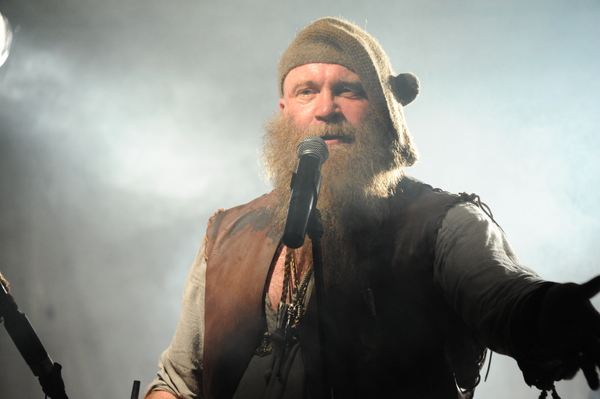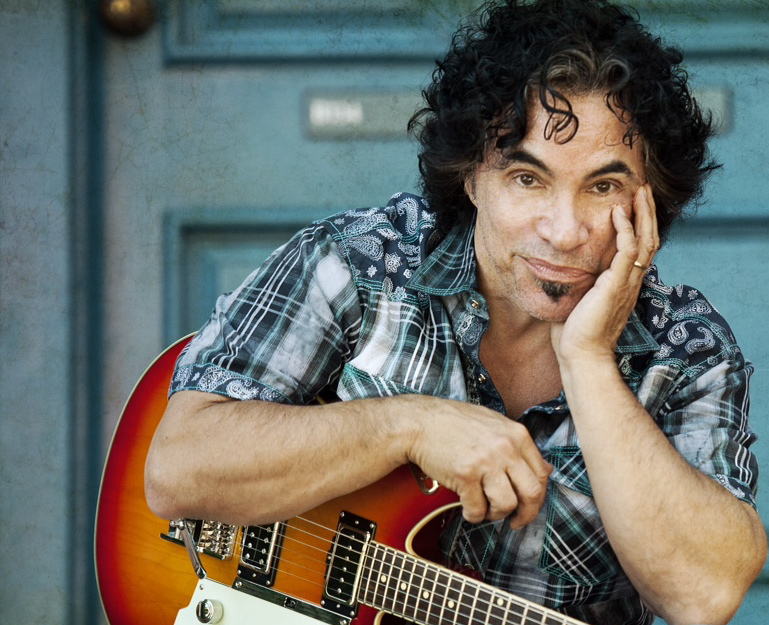Videos by American Songwriter
He’s led an army of 160 trained warriors through the gory battle scenes of Gladiator and the forests of Robin Hood. Is the father of five children. And heralded as one of Scotland’s most dedicated preservers of the country’s history. He also tours the world with a hard-rocking, metallic and traditional pipe band known as Saor Patrol (pronounced Shore Patrol). Charlie “Chick” Allan towers tall and fully-bearded, a bear of a man who appears as intimidating off-screen as he is on-screen with sword and a severed head in hand. That is, until you get to know him.
Get him talking about his heart’s passion, the Clanranald Trust for Scotland and their re-created medieval village of Duncarron, designed to educate upcoming generations as a living museum and experiential history center – and you know he’s a man who knows how to turn dreams into reality. He also has a depth and gentleness to him that lets you know you’re dealing with an old soul and a generous spirit.
No, Charlie Allan is not who you expect him to be. And perhaps that is what makes his music and his life’s calling so intriguing.
Tell me your story. How did you become a musician and what inspired you to form Saor Patrol?
I was a musician from an early age. At age 12, I was taught to play the accordion. This obviously gave me an ear for music. But it wasn’t until the mid-‘90’s that I decided one day that we should have music within our Clanranald Trust group. We had everything else like a film combat team and the education department that visited schools and the living history side of things, too. So it seemed a good idea to take up the pipes.
I understand you taught yourself how to play the bagpipes while on the set of Gladiator. You also compose much of Saor Patrol’s music – blending rock with Celtic , tradition with contemporary— creating unique sounds that bridge the past with the future. What inspires you as a songwriter?
I did. I’d been shown how to play pipes by a mate, but decided to take a few lessons, so I went to Ewan Boyd, a well-known piper. The “strict” style was not for me. As Ewan put it, I already had my own style from exploring around myself. So, we decided since I had a grasp of the scale the best thing to do would be to show me in great detail how to maintain the pipes and tune them, sort of a crash course in troubleshooting. I saw and heard other bands play pipes off the strict style, but still sticking to traditional music and thought ‘hmm, I could do something different.’ I felt I could play the blues on the pipes (and I do ) so I did. I practiced while on the set of Gladiator and thought I was doing okay when I got back, but apparently it was a painful experience for folk upstairs in the office.
My inspiration for the music comes from where I am, personal loss or gain and just what vibe I pick up from where I am. It’s a good process I think, and I whistle tunes into my phone as and when they come and then later they become compositions.
You have a unique purpose behind all of your creative efforts – music and acting. You are the CEO/founder of the Clanranald Trust of Scotland and developer of Duncarron, and your efforts with Combat International and Saor Patrol all go to fund those efforts. Many people love history and their country, but you’ve dedicated your life, time and work to preserving the historical knowledge and heritage and passing along Scotland’s rich history – you speak at schools and at concerts. How did you decide that this is what you were meant to do? Where did this passion come from?
The passion came from when I was a 15-year-old kid at school. I was in a history lesson and when the “Picts” were mentioned (the indigenous Celts of Scotland labelled ‘picts’ from the Latin ‘Picti,’ meaning painted people) I was told we were not and did not cover their history, but would cover English history instead. I objected. Much to my dismay, to no avail. So I was off to read up on these illusive peoples of Scotland. In my late teens and up to my 30’s, I would travel around every weekend to the North checking out historic places and getting back to where my ancestors came from.
I get the sense that it’s all about giving back for you. To Scotland, to children, to future generations. What is the most important thing you want to pass along to the next generation?
It is, and I feel that I have to do this and leave something established that is accessible to all.Something that will run like a well-oiled machine and never stop. Something nobody can abuse for their own gain or change for their own desires. I hope some of our present and future generations will take up the banner and carry on. That would be my final wish.
Combat International is highly specialized in the film industry. There aren’t many actors in the world who have specialized knowledge in medieval weaponry/combat – how did you develop those skills?
I developed this from basics I picked up on film sets from other enthusiasts and many years of martial arts adapting my eastern skills to recognize the western skills found in the old fight manuals of the great swordmasters. Understanding how a weapon works, any weapon, is the key. The movie stuff is quite flamboyant at times, but we try to stay as close to reality as possible. We have an understanding amongst the group: “If you can’t take the knocks and suffer for the art, purely to see the project get the best from us, then leave.”
Saor Patrol is a formidable looking group of guys. Yet I sense that underneath appearances, there are soft hearts, caring spirits and old souls. What bands you guys together as brothers in spirit?
[Laughs.] Yeah, we get asked if we are a bike gang all too often and folks get a bit freaked out from time to time. We smile, but sometimes that doesn’t help either. We surprise folk with our generosity and banter often. We – Kev Johnston (drums), Marcus Dickson (drums), Mark Monaghan (drums), Steve Legget (guitar) and myself – have all known each other for many years, 30 years, some of us. We have an understanding that if someone is having a bad day, they have to say so. We know each other’s current problems, etc., and we are so in tune with each other on and off the stage it’s crazy, even to us sometimes.
What does music give you, personally?
The music gives me feedback for my own strength, it verifies what I’m doing, the music is all about the Clan, me. My brothers, our lives, and I enjoy seeing people enjoy the power of our music. It’s a fantastic way to be heard when promoting what we do back home in Scotland. We have their attention and they listen. Through that we get interest, inspire others to come to Scotland, if not, to help at Duncarron. We promote our culture with attitude and pride, like “Wham!!! How about that then??” With a huge smile. There were 35,000 people in front of us at Wacken open air festival this year in Germany. What a charge to be able to blast the music and promote what we do.
What role does fear and faith play in your creative process?
Fear? I don’t really experience fear; anticipation, yes, but real fear is only something I think I experience when my kids are in any danger. Faith is something I have in Mother Nature and good friends, the fact that if we do good, we will be forever rich in whatever we want around us. Work, friends, people, etc.
What do find most challenging in your creative process?
Finding time to be creative in music. Peace and quiet and switching off mobiles and disconnecting is, I guess, the most challenging thing for me.
Where do you find balance and renewal? So many artists struggle with this.
Balance and renewal comes with being willing to adapt. We, too, feel we need to hold on to our original sound, but to be honest our sound just gets bigger and fuller all the time. Or is that just the size of the PA equipment? I think we don’t have a problem with balance because we are, as the latest album claims, a “two-headed dog.” We have pipes and drums for the cultural side with our traditional dancers and then we have the “Scottish Medieval Rock” sound and we recently introduced vocals to the indigenous sounds.
Let’s talk about your music. You recently released an album Duncarron. What can listeners expect?
Some pretty cool beats and fast tempos. Lots of heart-felt pipe in there, too. Music, we have been told, that gets right to the soul.
You have taken on big goals, big dreams and have refused to give up even when things get tough. What have you learned about pursuing a dream? What advice would you give?
If people give advice take it, if people say it’s too hard or too difficult, ignore that statement. If they try to drag you down. Advise them to seek help or dump them. Nothing is impossible. If someone brings you a problem to what you try to do, ask them to bring a solution. Never, ever understate yourself or your band.
In your opinion, what is the key to a successful music career?
Flash answer would be: pay attention to your fans first and foremost. Get them involved during your performance. Don’t be too choreographed and, most of all, have fun on stage. They can tell when it’s real. You’re being watched, so be real and be yourself.
How is Duncarron coming along?
Duncarron is coming along fine and “Charlie’s Army” the documentary by STV has made things really kick off. Lots of great interest from lots of avenues. Lots to be seen on our Duncarron medieval village Facebook page, too. Please like it.
What’s next for Saor Patrol?
Hopefully, another session in the studios for a new album and I hope we can get to Australia soon. Some funding assistance to attend the Grandfather Mountain Highland games and other games wouldn’t go amiss. We have been there the last two years, but have had to fund the flights ourselves. We still raised awareness, but it would be nice not to make a loss and bring some funds home to Duncarron.














Leave a Reply
Only members can comment. Become a member. Already a member? Log in.